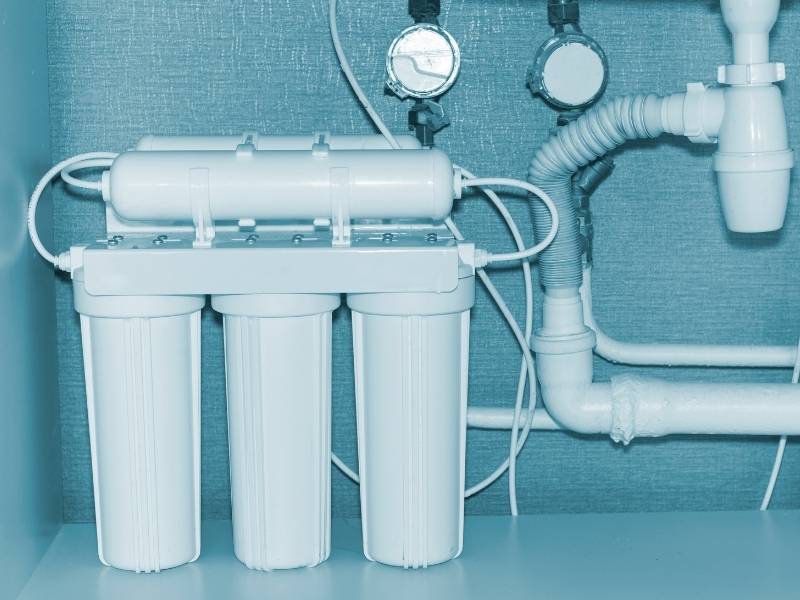Water is absolutely essential for life as we know it and plays a key role in maintaining general health in humans too. This is why many experts recommend that we all drink eight glasses – or approximately two liters – of water per day. H2O helps to hydrate our cells, keeps our organs in peak condition, and contributes to the proper functioning of many bodily processes. But what about the quality of the water we drink? Thanks to water filtration systems, there’s a way to ensure good water quality in your home.
However, more and more people around the world are thinking more carefully about the water they drink, with over half of Americans admit that they feel some level of concern or worry about their municipal water supply. In response, we’ve seen a rise in the production, sale, and general usage of water filter systems. This guide will answer some of the most common questions about filtration.
Water Filtration Questions and Answers

What are Water Filters?
Water filters can come in a wide range of forms and sizes, but they’re all focused on accomplishing the same essential function: filtering water. They’re designed to clean up the water that passes through them, removing a wide range of contaminants and undesirable elements in order to provide the user with a better quality water supply.
What do Water Filters Eliminate?
The exact nature of each water filter can vary from model to model. They don’t all get rid of the same contaminants. Some models are quite basic, focused only on removing physical elements like silt and sand, while others are much more advanced, with multiple layers of filtration media and technology to get rid of all kinds of potential contaminants.
There are dozens of different types of contaminants out there that can affect your water in many ways. Some of them may affect the taste, while others affect the odor, the color, or even the safety of your water. Here are some examples of contaminants:
⎆ Physical Particles
If you were to look at a sample of municipal or well water under a high-powered microscope, you might notice all kinds of tiny particles, invisible to the human eye, hiding among the droplets. These particles can include anything from sand and silt to gravel, rust, oils, metals, and microplastics too. In extremely small quantities, they might not pose much of a risk, but over time, they can build up inside the body and cause health problems.
⎆ Chlorine
One of the main targets of water filters is chlorine. It’s used in water cleaning facilities to sanitize water supplies and kill bacteria, but it’s also regarded as a dangerous chemical that can give water an unpleasant taste and odor. Water filters get rid of chlorine and help to make water taste and smell much better.
⎆ Heavy metals
The term ‘heavy metal’ is used for various metallic elements that have high densities and tend to be quite toxic or poisonous, even in small amounts. Examples include arsenic, lead, and mercury, and all of these metals and more can make their way into your water supply and your body.
⎆ Bacteria
It’s even possible for bacteria and other micro-organisms to make their way into your water supply, especially if you rely on well water. Bacteria like E. coli can make their way into the supply and then potentially infect those who drink the water, leading to painful symptoms and even possible hospitalization in some cases.
What are some of the benefits of a water filter system?
So why might you want to install a water filter in the first place? Well, there is a range of advantages to doing so. Here are just a few examples:
⎆ Convenience
Having a water filter system in your home makes it so convenient to get clean, fresh water in every room.
As The Perfect Water explains, “Not only does a whole house system allow you to count on quality filtered water at every faucet, but it also provides you with a simple, singular point of maintenance, so you change one filter and not one filter at every sink. Making it easier to enjoy your water and easier to keep your whole house water filter running at peak efficiency.”
⎆ Safer Water
One of the main benefits of a water filter system is that it helps clean up your water from contaminants. With a filtration system in place, you can safely drink all the water that comes from your faucets without having to worry about bacteria, chlorine, silt, and so on. All of this can result in various health advantages for you and your family.
⎆ Money-Saving
Believe it or not, a water filter system can even save you a lot of money too. Yes, you must cover the costs of installation. But once it’s up and running, you save a lot by not buying bottled water each week. Plus, with healthy water in the home, you have a lower chance of health issues associated with contaminants and bacteria.
Are Water Filters Worth the Price?
This is one of the main questions, and the answer is most often a resounding yes. Water filters are a cost-effective way to get cleaner, safer, purer water into your home. There it can be used for everything from drinking to cooking to cleaning and more.
They offer a wide range of advantages, with minimal drawbacks. There’s also not much maintenance required aside from changing the filter media.
In Conclusion
It’s clear to see that water filters make a real difference to the average home. Plus, they are a consideration for anyone who wants to improve the health of their household with cleaner water.
If you have any further questions, please leave them in the comments below and while you’re there, try clicking through a few links for more interesting posts about ALL things DESIGN.
Images Courtesy of Canva.
Other Posts You Might Enjoy:
How to Choose the Best Hot Water Systems
5 Showerheads for Hard Water Your Hair & Skin Will Appreciate





